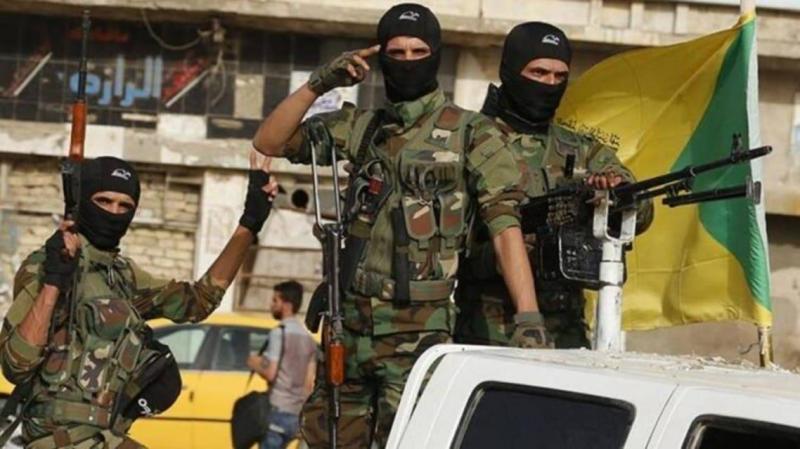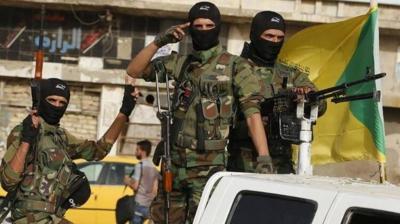Under the title "Factions Division in Iraq: Iran Hides a Clear Reality!", the Al Arabiya website reported that despite the immense pressures from Iran-aligned factions, Baghdad announced the success of the new round of Iraqi-American dialogue, including an agreement on the foundations of joint cooperation between the two countries, and the transition of combat forces to an advisory role by the end of 2021. However, the positions of the armed groups in Iraq remained divided, with some supporting the decision and others rejecting it; this variability complicated matters on the ground somewhat.
Following the killings of Suleimani and Al-Muhandis, the Iraqi Parliament issued a decision in January, in the absence of Kurds and Sunnis, to expel American forces from the country. But the United States is not prepared for a complete withdrawal due to its presence being vital for U.S. strategic interests in the Middle East in general. Furthermore, the armed factions did not show a unified stance on the matter, reflecting the reality of their differences and infighting, which was clearly demonstrated through statements from their spokespeople and opinions shared on their platforms.
Many attribute these divisions to the absence of influential figures like Abu Mahdi Al-Muhandis or Qassem Suleimani, who were figures that leaders feared, especially since they were under their command. Despite the presence of Qaani at the head of the Revolutionary Guard, numerous reports have confirmed that he has a weak character, unable to gather the leaders of the factions and reach a unified stance.
According to information, Tehran is trying hard to conceal these divisions and portray a single decision among the factions loyal to it.
**A Significant Dispersal Not Controlled by Qaani**
In an interview with Al Arabiya.net, academic and strategic security expert Firas Elias explained that the leadership vacuum resulting from the assassination of Quds Force commander Qassem Suleimani and Deputy Chairman of the Popular Mobilization Forces Al-Muhandis has produced a significant dispersal in the behaviors and movements of armed factions. He emphasized that those two figures had played an important role in structuring the movements of these factions, controlling the competition between them, and unifying their stances due to their long history in armed operations and their organizational status.
He also stressed that the new commander of the Quds Force, Ismail Qaani, has been unable to fill the void left by Suleimani's absence, specifically regarding enforcing compliance with directives and positions coming from Tehran, which has been evident in how these factions interacted with the outcomes of the fourth round of Iraqi-American strategic dialogue.
**Three Contradictory Positions**
He revealed that three positions have emerged regarding the withdrawal decision thus far: the first was a welcoming stance from the "Fateh Alliance," the second was a skeptical position from "Asa'ib Ahl al-Haq," and the last was a rejecting position that considered these outcomes mere manipulation of concepts (from groups like Hezbollah Brigades, Nujaba Movement, and Sayyid al-Shuhada Brigades). This division generally stems from the multiplicity of influential Iranian players in Iraq, particularly concerning the relationship with armed factions, referring here to the Office of the Leader and intelligence, alongside the Revolutionary Guard.
He pointed out that after the meeting between Al-Kadhimi and Biden, Iran made it clear to the factions that it did not view the outcomes of their discussions negatively, emphasizing the need to maintain calm until the true American intentions regarding staying or withdrawing became clear, based on the message Qaani conveyed to the factions.
He also highlighted the necessity of ending the current differentiation among the leaders of these factions, specifically Hadi Al-Amiri, the leader of the Badr Organization, Qais Khazali, the leader of Asa'ib Ahl al-Haq, and Abdulaziz Al-Muhandis (Abu Fadak) of the Hezbollah Brigades, as this differentiation has influenced the nature of Iranian influence and is essential to allow space for the previous round of negotiations in Vienna concerning the nuclear agreement.
Thus, the trajectory of calm or escalation with American forces in the coming period will depend on the progress of the withdrawal of American combat forces on the one hand, and the Vienna negotiations on the other, with a note that attacks carried out by Katyusha cells, whether through rocket fire or attacks on logistical support convoys, will continue intermittently, aiming to send clear messages to the government to commit to expelling the forces, as well as additional messages to the base of these factions to maintain momentum in the streets, as seen in the recent attack carried out by the Cave Dwellers faction in Babil.
**Threat to Al-Kadhimi's Government**
Strategic analyst Ghanem Al-Abed explained to Al Arabiya.net that the divisions among the factions after the U.S. announced the end of combat missions in Iraq stem from fears that the withdrawal of Muqtada Al-Sadr from the upcoming parliamentary elections could precede the formation of a military government or a state of emergency led by Al-Kadhimi with U.S. and British support, along with approval from some Sunni, Kurdish, and Shiite parties, who see this as a precursor to ending their influence, decision-making, and disarming them. Therefore, they began justifying the end of combat missions as ambiguous and unclear to cling to their weapons, which they promised to hand over once U.S. forces departed.
Al-Abed added that the factions have begun to see Al-Kadhimi as their primary enemy, so they will resort to creating chaos that won't stop at targeting the U.S. embassy, Ain Al-Asad base, or Erbil Airport but will extend further, even if it requires committing assassination operations against influential figures to threaten his government.
Regarding the potential U.S. response, even if one occurs, it will target objectives present along the Iraqi-Syrian border, considered fixed targets, but most inside Iraq are mobile targets that do not yield the desired results.
It is worth noting that Iraqi Prime Minister Mustafa Al-Kadhimi confirmed on Sunday that there will be no U.S. forces in Iraq by the end of this year, according to a statement from his office. He revealed that an agreement was made for no U.S. combat forces to be present in Iraq by December 31, 2021, stressing that his country is continuing in its quest to provide honorable opportunities for its citizens and to create new beginnings that contribute to serving the populace.




